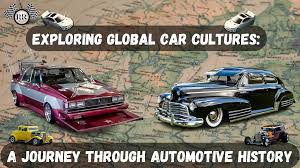Cars are more than just vehicles they’re an extension of culture, identity, and lifestyle. From the bustling streets of Tokyo to the open highways of Texas, the cars people drive often reflect their environment, values, and even their dreams.
Let’s explore how car culture varies around the globe, why people choose the cars they do, and what it says about the regions they call home.
The United States
In the U.S., cars symbolize freedom and individuality. With sprawling highways and wide-open spaces, it’s no surprise that large vehicles like SUVs and trucks dominate the market. Brands like Ford and Chevrolet are household names, with models such as the Ford F-150 becoming icons of American car culture.
But it’s not all about size. In cities like Los Angeles, sleek sports cars and luxury vehicles are just as popular, reflecting a status-driven lifestyle. Meanwhile, the rise of electric cars, led by Tesla, highlights a growing trend toward innovation and sustainability.
Japan
Japan’s car culture is all about efficiency, reliability, and innovation. With limited space and high urban density, compact cars, known as kei cars, are extremely popular. These small, affordable vehicles are perfect for city driving and parking.
Japan is also home to some of the world’s most iconic car brands, including Toyota, Honda, and Nissan. On the flip side, the underground car tuning scene, made famous by the Fast and Furious franchise, showcases Japan’s love for speed and customization.
Germany
In Germany, cars are a symbol of precision and quality. Home to automotive giants like BMW, Mercedes-Benz, and Volkswagen, the country is known for producing vehicles that blend luxury with performance.
The Autobahn, Germany’s famed highway network with sections of unrestricted speed, perfectly encapsulates the German love for driving. It’s a place where drivers can truly experience the engineering prowess of their cars.
Italy
Italians view cars as works of art. From the sleek curves of a Ferrari to the timeless design of a Fiat 500, Italian cars are all about style and passion.
Sports cars like Lamborghini and Maserati reflect Italy’s love for speed and luxury, while smaller city-friendly cars dominate urban landscapes. Driving in Italy is as much about making a statement as it is about getting from point A to point B.
India
In India, cars are seen as a gateway to mobility and economic progress. With a booming middle class, small and affordable cars like the Maruti Suzuki dominate the market. Compact SUVs are also gaining popularity as families seek versatile and spacious options.
Despite the growing love for cars, motorcycles and scooters still rule the roads in urban areas due to their affordability and ability to navigate heavy traffic.
Australia
Australians have a deep connection with cars, often favoring vehicles that can handle both city streets and rugged outback terrains. Utes (utility vehicles) and 4x4s are popular choices, reflecting a love for adventure and outdoor activities.
The vast Australian landscape makes long road trips a cherished tradition, with iconic drives like the Great Ocean Road drawing locals and tourists alike.
Why Car Culture Matters
Car culture is about more than just transportation it’s a reflection of local values, lifestyles, and aspirations. Whether it’s the efficiency of Japanese kei cars, the luxury of German engineering, or the rugged reliability of Australian 4x4s, each region’s car choices tell a story.
As the automotive industry continues to evolve with trends like electrification and autonomous driving, car culture will also adapt, reflecting the changing priorities of people around the world.
From muscle cars in America to compact wonders in Japan, cars connect us to our environment, our communities, and even ourselves. They’re not just machines they’re cultural icons.
What does your car say about where you’re from? Share your thoughts and join the conversation about car culture around the world!
